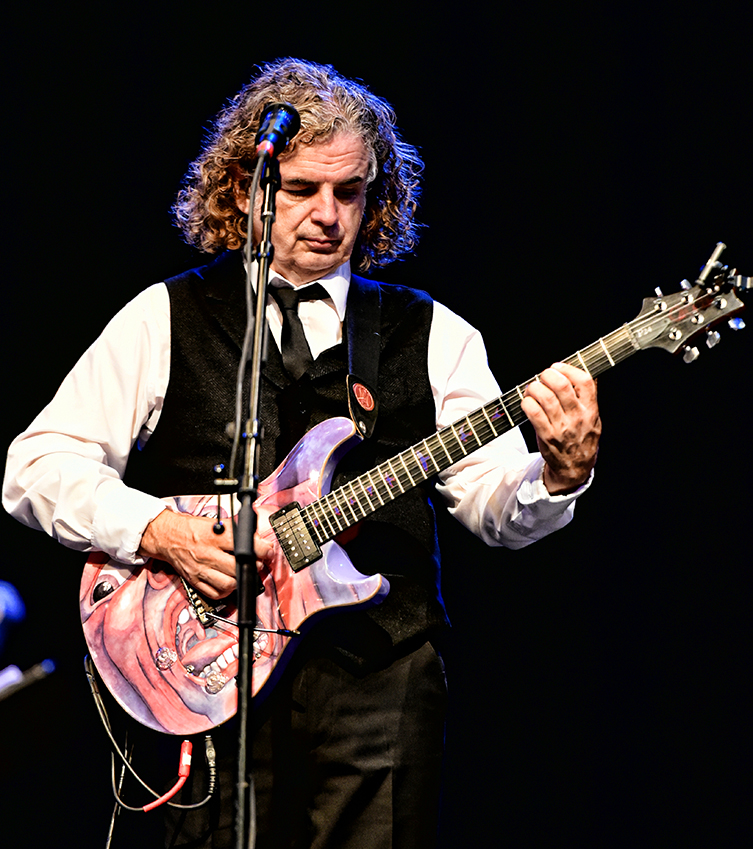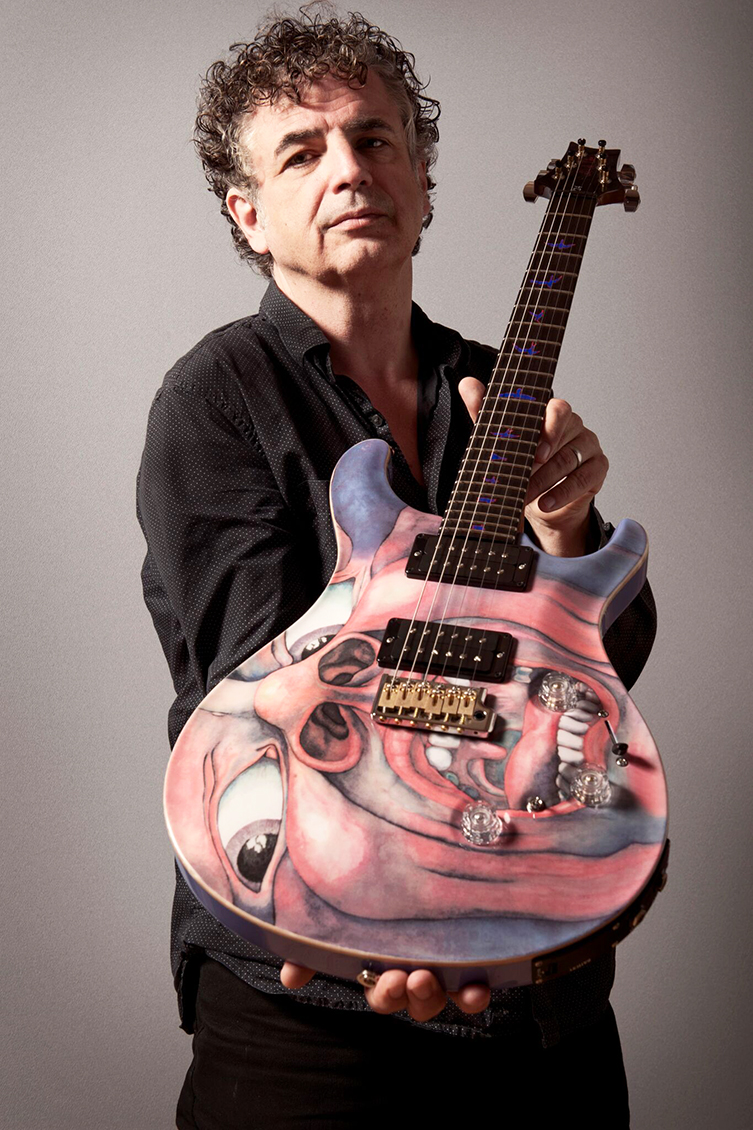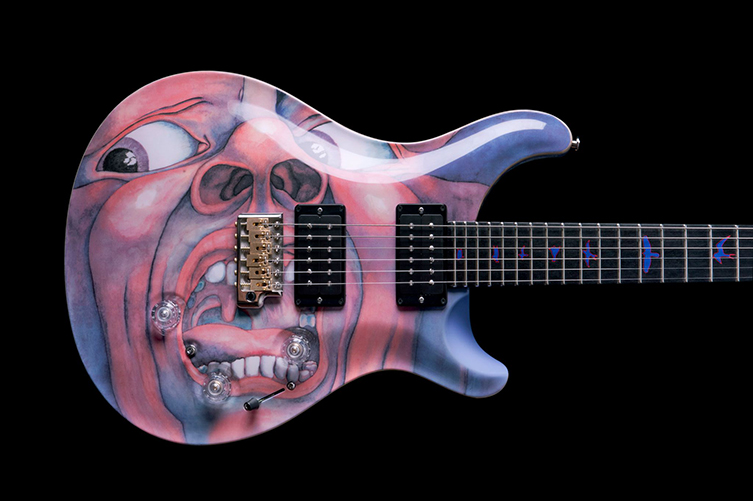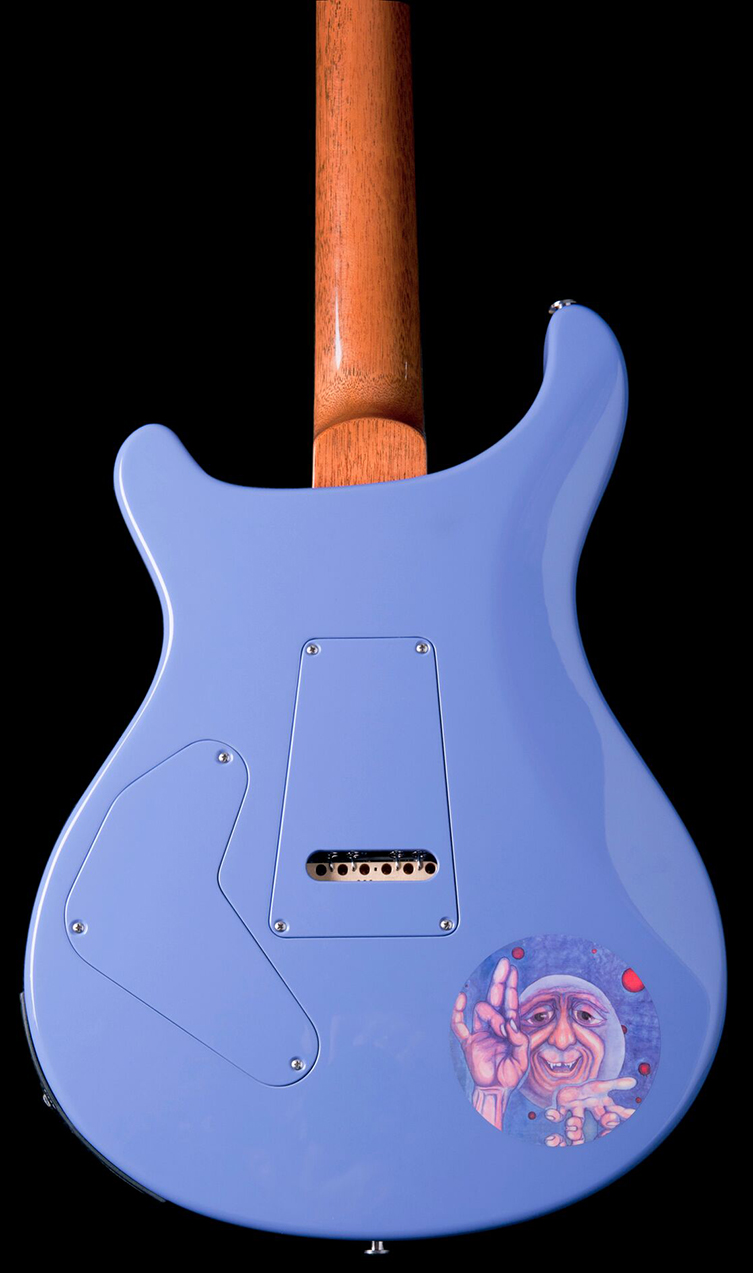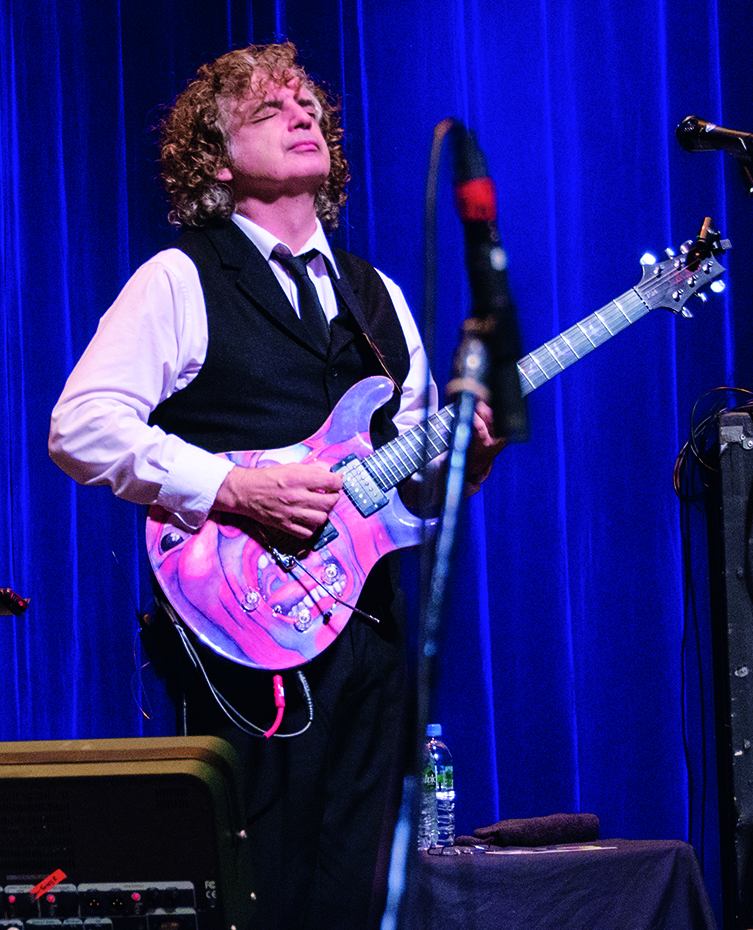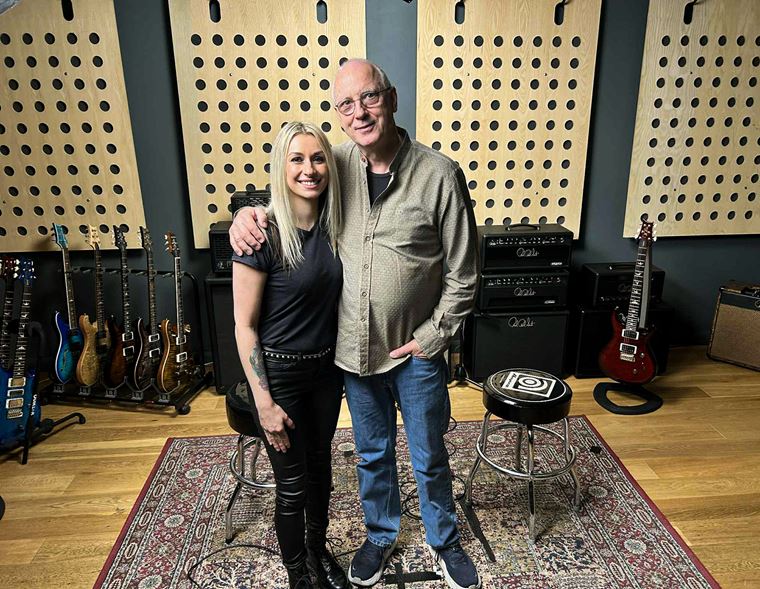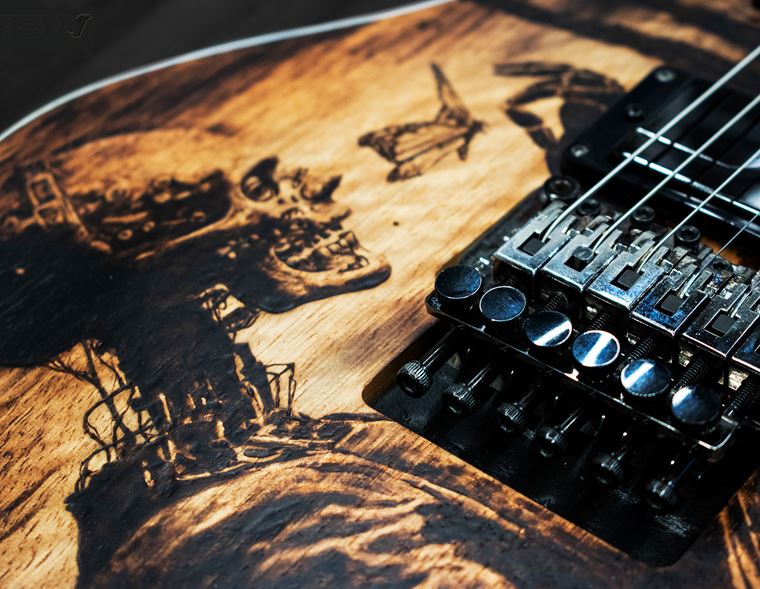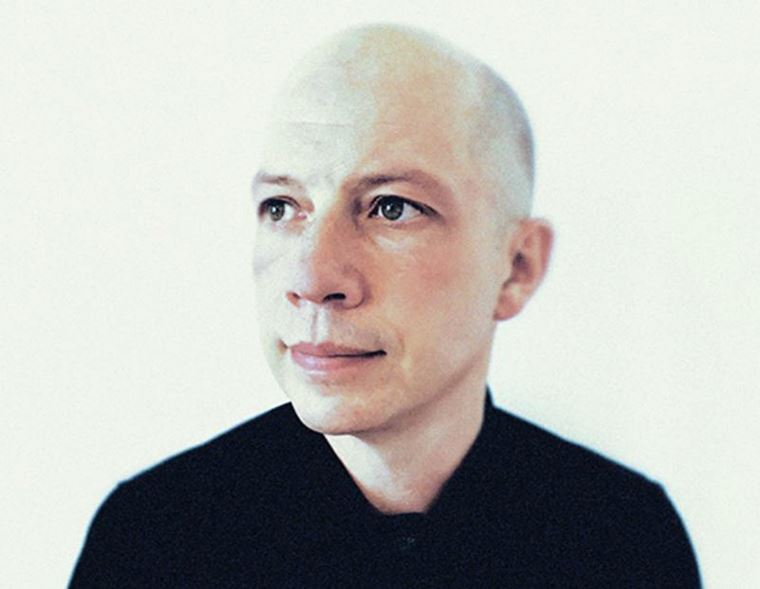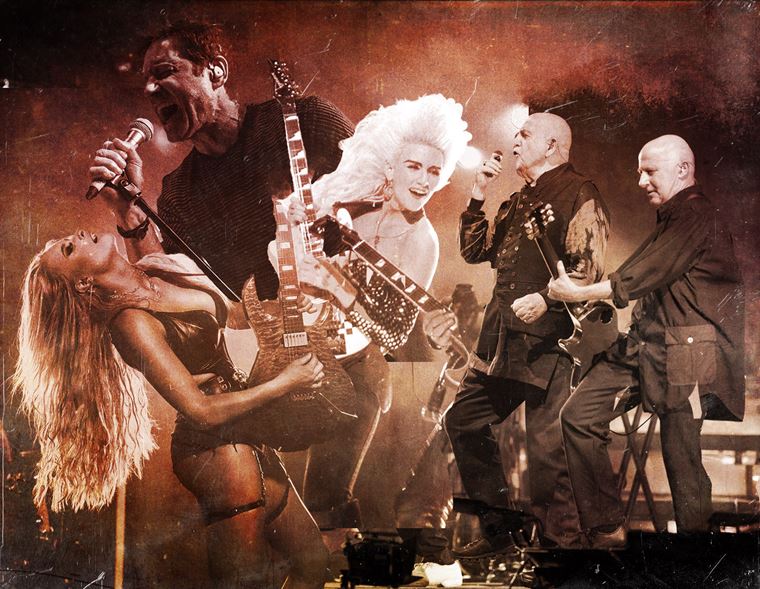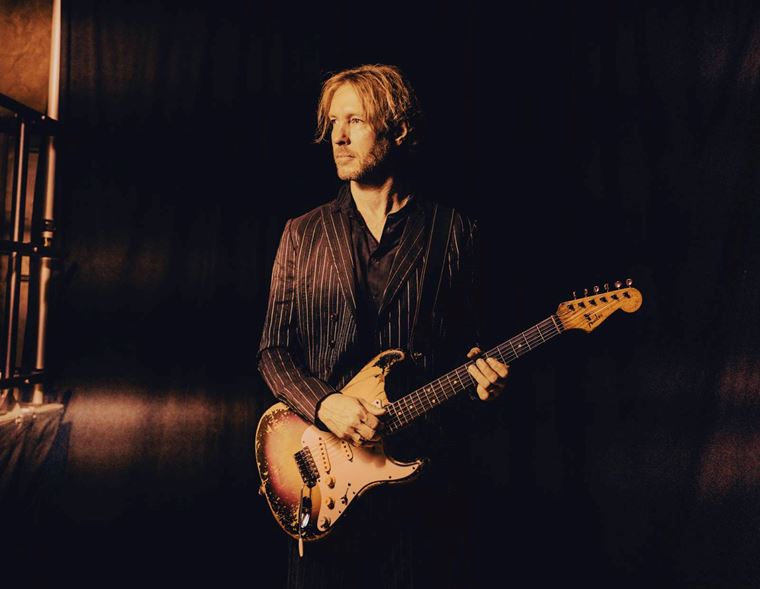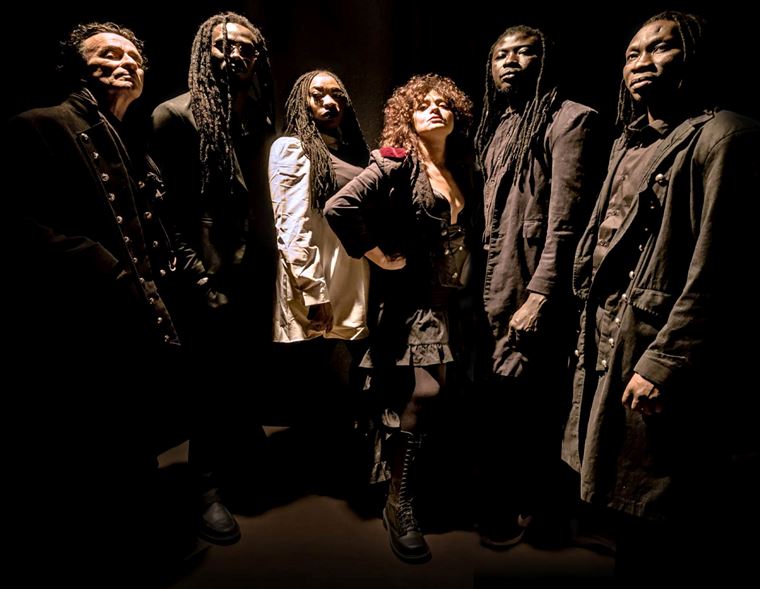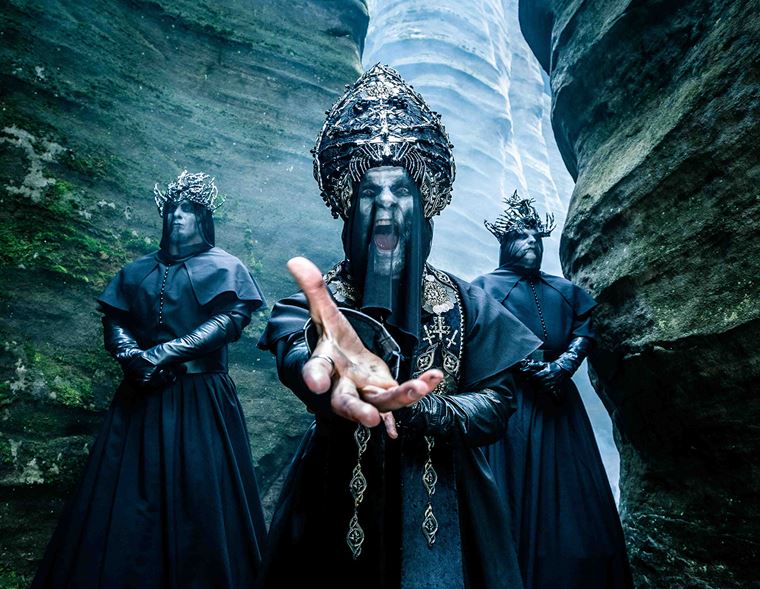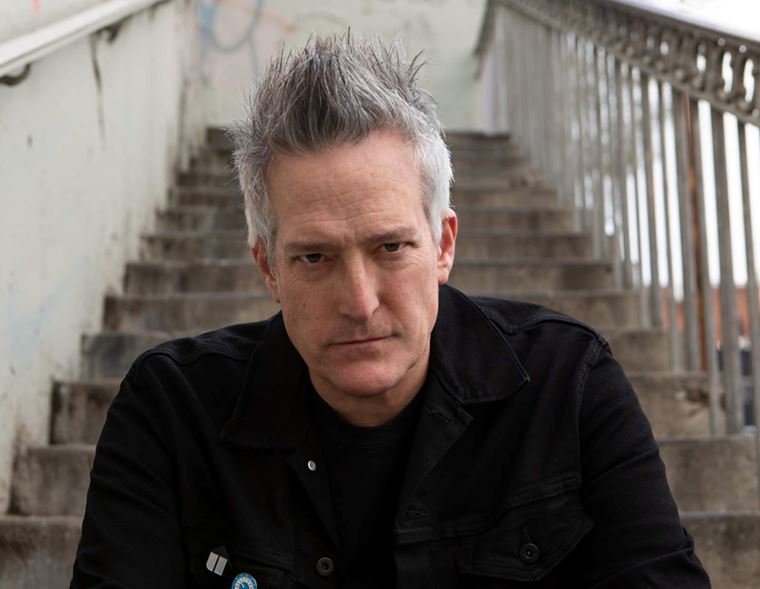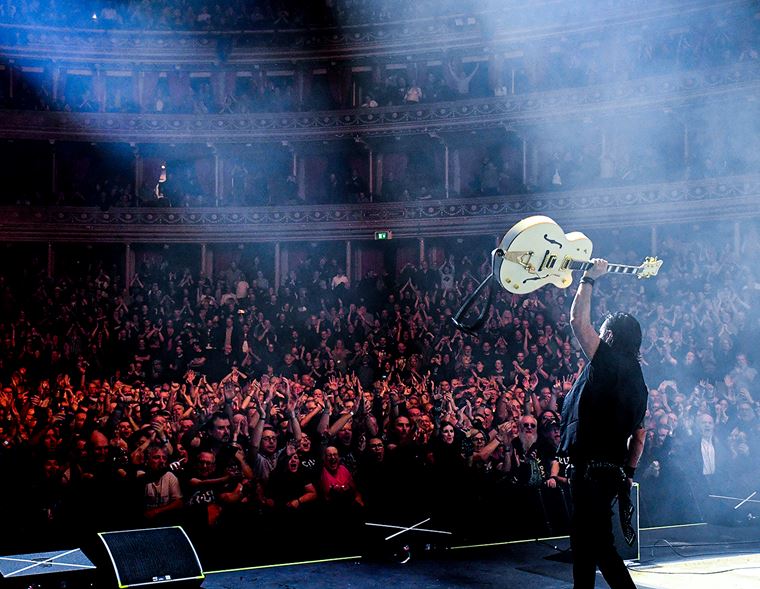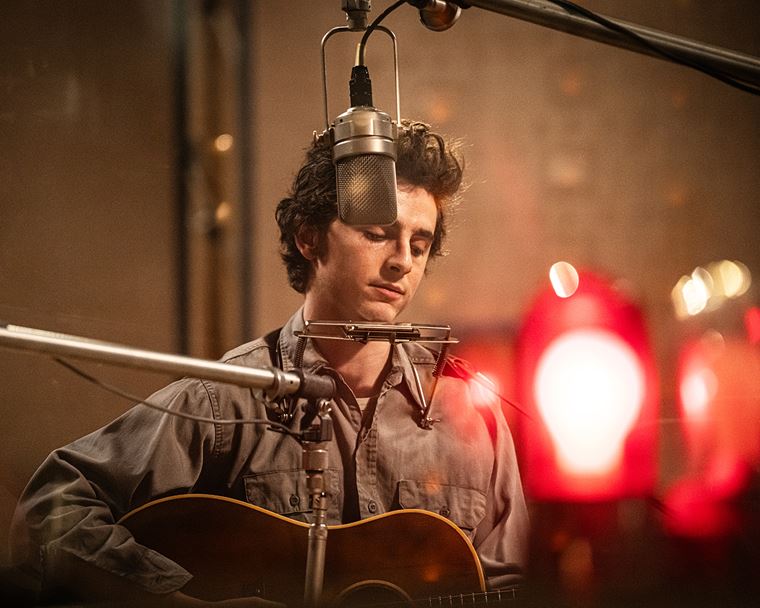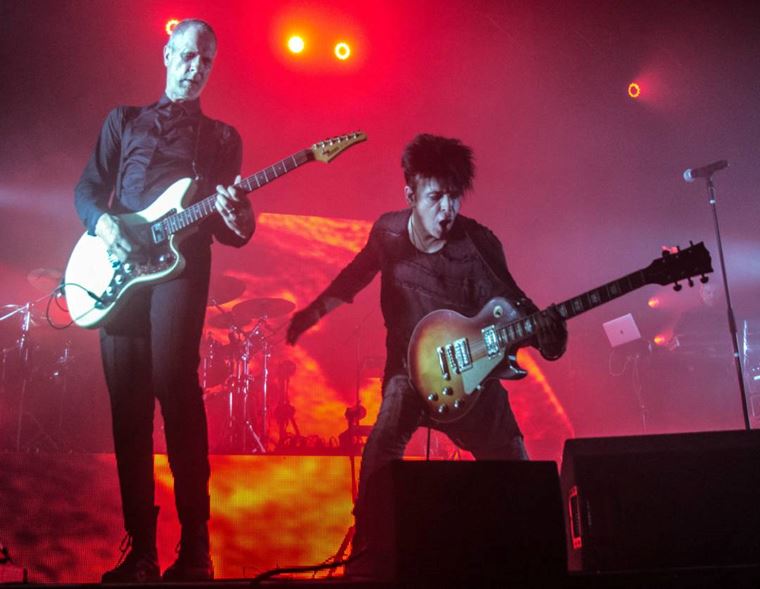King Crimson: Jakko Jakszyk EXCLUSIVE Interview
King Crimson are one of the most indefinable bands in the history of music. Under the guided leadership of guitarist Robert Fripp, King Crimson have shed various skins over the years, appearing in a multitude of guises with a large number of musicians, some long-serving, others relatively new. From their incarnation in the late 60s, Crimson defined (with Yes and Genesis) the British Prog Rock movement before abandoning it years later to explore rather less-charted waters. Their music is at times violent, propulsive, energetic, melodic, jazzy, abstract and beautiful: there really are no sufficient genre terms in existence to adequately appraise the King Crimson experience.
Today, Crimson are a well-oiled machine of 7 musicians that include Porcupine Tree's Gavin Harrison and R.E.M/Ministry drummer Bill Rieflin within a powerful lineup featuring no less than 3 drummers! Peter Gabriel's bass legend Tony Levin is also a member. We have had the very good fortune to enjoy a chat with both lead vocalist/co-guitarist Jakko Jakszyk and bassist extraordinaire Tony Levin. For this first instalment of our two-part Crimson interview, we speak to Jakko about playing with this most polymorphous of musical collectives, why digital is the only way to go and carving a path and a voice within the bombastic maelstrom that is King Crimson.
Jakko, thank you so much for talking to us. You’ve now been an official member of King Crimson for five years. It must be one of the most intimidating gigs for any musician: how have you found the experience so far, in terms of how it is compared with how you expected it to be?
Well, when I first started it was daunting on a number of levels. But of course, that’s all inside one’s own head. You create your own idea about who these individuals are, but in the end, they’re just guys doing a job the same as you. And you have to get ‘over it’ otherwise you’d be too paralysed to play at all.
At an early rehearsal Robert took me aside at the end of the day and said “Tomorrow Jakko, I want you to try and pay more attention to what Tony (Levin) and I are playing. I apologised and asked if I was really playing that badly and not locking in with them. “No, no’ Robert said “I want you to listen more carefully because we’re making infinitely more mistakes than you are’
There is a wide variety of material being played on these recent tours: how do the setlists get chosen?
We’ve been touring in 2 chunks every year. At the beginning of each chunk, we’ve been adding 3 additional tunes. So we now have a repertoire of around 45 songs. We rehearse and run through them all at rehearsal, then we get an email at around lunchtime on a show day with that nights set list. So it varies at every single show. Pieces added, some dropped and order changed. When Gavin was interviewed recently he was asked who writes the set list, and he said it was “Stevie Wonder’! However, I’m pretty sure Robert does it!!
The setlists also seem quite varied: how you all as a band rehearsed a huge body of work?
Well, it varies, but on the whole Gavin and I make demos of the material, whether it’s a brand new piece or an older one, and we send this to everyone so they have a ‘virtual' band to practice with. As we’ve made multi-tracks we can send versions with and without individuals instruments. We then rehearse in separate configurations. Gav writes these amazing arrangements for the 3 drummers and the drummers usually rehearse on their own, with the multi-tracks we’ve created, for a week before we all join together for full rehearsals. And Robert and I will get together to practice parts and revoice stuff, and also add keyboards etc.
You have worked previously with members and ex-members of Crimson prior to joining (notably in Jakszyk Collins Fripp and 21st Century Schizoid Band) so you were clearly the right man for the job but how did your joining of King Crimson actually occur?
Well, when I first did the Schizoid Band thing (A band that featured former members of King Crimson, apart from me, playing older Crimson material that the then current band didn’t touch) I got a phone call from Robert out of the blue asking me how rehearsals were going! I’d never spoken to him before and he’d been a big childhood hero of mine, so it was a bit weird, to say the least. I told him, honestly, that the rehearsals had been 3 of the most uncomfortable and unpleasant weeks of my life as a musician. He said he wasn’t surprised and became a real support from then on and helped me get through it. So that’s how I got to know him. I was kind of his surrogate self in this band of previous members.
"Crimson was such an early influence that I didn’t have to get into the style of it all, it’s part of my DNA"
This lead to me asking him to play on my solo record (The Bruised Romantic Glee Club) which he kindly did on 2 numbers, one of which we co-wrote. Then Ian Wallace, who joined the Schizoids when Mike Giles left (as he did when Mike left the original Crimson) died rather tragically. I sang the Crimson tune ‘Islands’ at his funeral accompanied by Mel Collins and Robert was in the front row. Afterwards, he asked me to lunch at his house. Then he invited me down to DGM studios in Wiltshire to improvise with him. He gave me a hard drive containing all we’d played that day when I left, and that eventually turned into the Jakszyk, Fripp and Collins album (A Scarcity Of Miracles).
Then Robert decided that there should be a band playing the older Crimson material, but one that had an authenticity. So he invited Gavin Harrison, Mel Collins, John Wetton and myself to a meeting at the DGM offices and we formed a band called ‘Crimson DNA’. Robert wanted to ‘direct’ it, but not actually be ‘in’ it. We got together a couple of times and started recording stuff, but then Robert called out of the blue again in 2013 to say he’d decided to reform Crimson and did I want to be the lead singer and 2nd guitarist. I didn’t hesitate in saying yes. One of the first people I called to tell them about it was my good pal bass player Nick Beggs. He said ‘Well, that’s the longest audition in Rock history'!
The music of King Crimson is dramatic, dynamic and by no means easy to play. Not only that, you are the lead singer as well as co-guitarist: how did you prepare for this?
All you can do is do your best. Learn the stuff and get on with it. Practice ahead of rehearsals till the muscle memory starts to kick in. Crimson was such an early influence that I didn’t have to get into the style of it all, it’s part of my DNA. And as I grew up listening to those early albums they influenced how I sing, so (hopefully) it works because it’s already part of how I play and sing anyway.
As singer and guitarist of a large band that can at times sound pretty violent, do you feel like you are at the centre of a storm every night? How do you cope with that?
It's all fine. We have our own individual monitor mixers on stage, so I can tweak stuff throughout the show, so I’m always on top of it, always able to create enough sonic space. No matter how cacophonous it may sound out front.
A fair amount of classic Crimson pieces use Mellotrons and other keyboard instruments: who looks after those parts live? Do you provide any synth textures via guitar synth?
Well, both Bill Reiflin and Jeremy Stacy use Mellotron emulators, Robert uses a Mellotron app on an iPad, and I use (on occasion) The Electro Harmonix Mel 9 pedal. None of it is guitar synth, though Robert uses a midi controller for his opening soundscapes and occasionally in improvs.
Any guitar player who shares a stage with Robert Fripp must be brave as well as talented: do you find that you both have very specifically different jobs to do, guitar-wise?
My job is to blend with Robert when we play the interlocked guitar pieces, but also to play a lot of his original parts from the older material, as some of this is tricky to play (purely from an ergonomic point of view) as he now plays exclusively in his ‘New standard tuning’. Which often places the notes in a more inaccessible place than where they were in standard tuning when he wrote this stuff.
"‘Discipline I have to count. Largely because there are some odd lengths that I find difficult to ‘feel’. 27 bars of 15/8 for example"
Since there are 7 of you on stage including three drummers, do you guys play with click tracks? Do you collectively have any tricks you use to make sure everybody can keep their place, musically?
We don’t have click tracks ‘per se’: nothing that runs throughout the whole show, like a lot of bands do these days (to keep in sync with film projections etc). But Gavin and Pat both have drum machines with clicks pre-programmed that they trigger in various pieces for the odd section here and there, and also the intro counts.
So you never see anyone ‘counting in’.
Even for super complicated parts? I’m thinking of the piece ‘Level 5’ in particular…
I don’t count in ‘Level’ 5, I just play the parts. We’ve been playing that since my first tour with them, so I can’t remember if I had to count it in the beginning.
We’ve been playing 'Larks Tongues In Aspic part 4', and I find I do have to count some of that. The opening section I play in 5/8 whilst most of the rest of the band are playing in 11/8. I started that playing by the feel of it, but thought it safer to count once we started playing in front of an audience. So it all varies.
On ‘Larks 1' I play Roberts original crossed picked line and that's alternate bars of 5/8 and 6/8 followed bar 14//8 whilst the rest of the band play in 7/8 and I never count that, apart from where I come in, which is on beat 4 of the 4th bar of 7, otherwise we’re all screwed if I mess that entry up!!
‘Discipline I have to count. Largely because there are some odd lengths that I find difficult to ‘feel’. 27 bars of 15/8 for example. And there are no clues. No melody to follow or anything, so its very easy (for me anyway) to get lost. ‘Was that bar 21 or 22?'
How much of the set is improvised?
There a few tunes where we have a starting point and a cue to the end section and all in between is completely improvised. As those bits are starting to evolve, and new solos appear as we progress. Originally I did no soloing at all. It’s all Robert and Mel’s domain, but that's starting to change a little, at Robert’s suggestion, which is fantastic for me.
In terms of guitars, you have a couple of incredible looking PRS Piezo 24 models. What do you prefer about PRS in particular?
Well, historically I’ve always used state of the art guitars. I played Steinbergers when I was in Level 42 and then a Parker Fly as they were very road worthy and stable, but I always had a thing for Gibsons and vintage instruments, but never took those out live. They were too unstable or just too expensive or rare to replace.
So when I joined Crimson I went for PRS as they felt like the best of both worlds. Modern instruments that had a more vintage feel. It just seemed somehow more appropriate for the music, and they’ve been great.
And who’s idea was it to put those incredible Krimzoid graphic finishes on them?
Well, PRS kindly asked if there might be a special guitar they could make for me, so I asked about the ‘Schizoid’ face. They were well up for it and came up with some lovely details like the red and blue dove inlays. Plus there's a bit from the inside of the gatefold sleeve on the back of the guitar that no one ever sees, of course.
It’s a stunning finish too. It looks like porcelain in the flesh. The pictures don’t do it justice.
Generally speaking, what do you look for in an electric guitar?
It's an undefinable thing, isn’t it? Certainly looks wise. But I like a slim neck and double cutaway guitars. I prefer vintage sounding humbuckers to the modern overwound super heavy things. But you know that you can pick up a number of guitars and some will just speak to you and feel right, even if it’s the same model as another, sometimes.
Robert Fripp devised his own tuning, New Standard Tuning. Is that something you’ve adopted?
Er…….No. It’s hard enough playing in ‘normal’ tuning!
When playing with another guitarist, what do find important to keep in mind?
Well in a Crimson context, its blending sound wise, and touch. Note length. Trying to match those details. Otherwise, I’m also trying to keep out of each others way, when appropriate, or laying down something for them to play over.
Something like ‘Fracture’ we split the opening line. Instead of Robert playing it on his own, we play each alternate note and try to make it sound as one.
What type of strings and plectra do you prefer?
I use D'Addario nickel wound EXL120’s. Light gauge 9-42’s. And I use the small Dunlop Jazz lll picks. The red ones, so I can find them when they fall on the floor!!
What for you are the benefits of a digital guitar set up?
There is little alternative in this version of Crimson. With 3 drummers down the front of the stage, an amp and cab combination would be a nightmare, as the first thing it would hit would be 3 sets of overheads. So a digital set up gives me complete control over the sounds.
I was using a Kemper, which is brilliant. In particular the profiling. I spent a day with various amp setups, and the profiles of these things are amazing. However, the fx side was not as quick and easy to operate. Plus I’m using a piezo pick up in the bridge of the guitar. With the Kemper, I had this going direct to the PA, with no control over the sound. I would switch it in using an A/B box, or volume pedal, and I was forever forgetting to turn it on, or indeed off.
I’m now using a Line 6 Helix, which is pretty fantastic. Not only is the whole effect side of it fantastically intuitive to use, but you can very easily place the various effects into any order. The other brilliant benefit is that it has two separate inputs, so I can have the piezo as a completely separate thing. Tweak it, process it and mix it with the normal pickups and then save it as a patch.
So it’s been invaluable really.
On a tour like this, how do you spend your downtime?
There isn’t much downtime when we’re actually on the road. We have travel days, where we spend far too much time in airports, or on busses. Reading, watching downloaded films etc. Then when we’re at the same venue multiple nights, I have to listen to previous shows to pick the download track from each gig for the website (DGMLive.com)
We play for 3 hours so by the time we meet guests and get back to the hotel its 1:00 or 2:00 am. If you can get 8 hours sleep then you only have about another 4 hours before you leave for the soundcheck
Does your other talent for comedy (Jakszyk has appeared on TV and on stages in comedy skits) come in handy on the tour bus?
No, not really. Gavin Harrison is the big joker in the band.
King Crimson are certainly a big band but do you think they are perhaps underrated in the whole grand scheme of rock music?
Who am I to judge that? I know this incarnation of the band seems to be pretty popular. Well tend to sell out most places, so there’s a feeling that this version has grown in popularity. Plus we keep seeing quite young people at the shows and women too!!!
Who knew that would happen?
Do you still have time to work on your solo career?
I've just started a new solo album, as it's been a while. Now seems a good time to try and do something again.
Going back a bit, who were your formative musical influences?
At the beginning? I was a fan of Crimson, obviously. I was also a fan of Terry Cath the guitarist in Chicago. Hard to imagine, if your experience is merely their syrupy ballads of the 80’s, but on their first album they devoted 1 whole side of a double album to a track called ‘Free Form guitar’ which is just feedback mostly.
I was a fan of the whole Canterbury thing. Hatfield and the North, Soft Machine, Robert Wyatt
And of course, I first saw Allan Holdsworth when he was in Soft Machine. Seeing him play for the first time was jaw dropping
You’ve been in and around the music industry for decades: what are the most significant changes to the industry from an artist’s position in your opinion?
It's the digital computer revolution of course. All the studio’s I worked in have mostly all closed down. Everywhere from Olympic, Trident, Advision, Sarm - you name it - virtually all gone.
And of course, the whole illegal download and streaming thing has just blown a vast hole into peoples ability to earn anything from music. I saw Peter Frampton recently tweeted his royalties from 55million streams. It was $1700. So if that's what's happening at his end of the income stream, it doesn’t bear thinking about the effect on newer or lesser known artists.
How does touring in 2018 compare with touring in, say, the 80s or the 90s?
It’s much the same, apart from the technical aspect. The ‘in ear’ monitoring for instance. But travelling is still the same.
And finally, what makes a great band member?
Not being an arsehole, not behaving with a sense of entitlement, treating the crew with the same respect you would your fellow band members and attempting to be a team player.
Seems obvious, doesn’t it?
Yes, when you put it that way! Jakko, thank you again for doing this: I think people will love to hear about what it’s like to be in such a unique musical position. Best of luck for the tour Jakko, and for the forthcoming solo album when it happens!
King Crimson are on tour throughout the UK in November followed by Japan in December. For dates, check out the King Crimson website https://www.dgmlive.com/ and their Facebook page https://www.facebook.com/kingcrimsonofficial/
Check back in next week for our second installment of King Crimson interviews, this time with legendary bassist Tony Levin.

